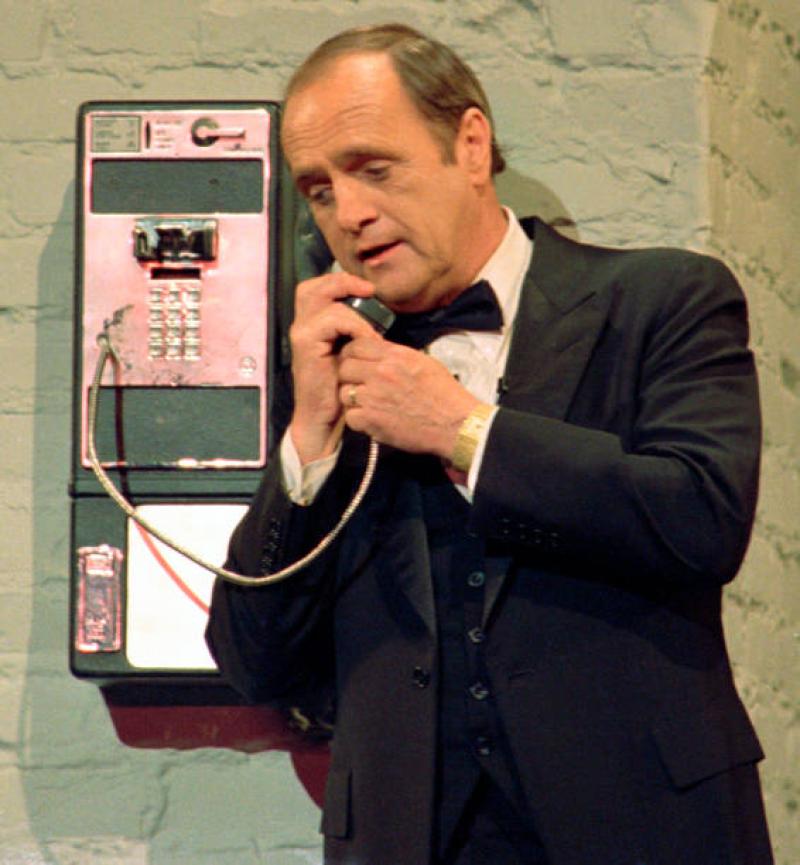Bob Newhart, everyman comic who elevated sitcom to art form, dies at 94
By: Story by Ethan Sacks



B ob Newhart, the former accountant who rose to comedy superstardom with a mathematical precision in timing a deadpan routine down to a decimal point, died Thursday, according to his publicist.
He was 94.
Newhart certainly looked the part of the weary everyman that he played so well on the comedy albums that launched his career, and on the two major sitcoms that bore his name — “The Bob Newhart Show,” which ran on CBS from 1972 to 1978, and “Newhart,” which ran on the same network from 1982 to 1990.
But there was as much Stan Laurel as there was Oliver Hardy in Newhart’s repertory, said actor Peter Scolari, a friend and costar on “Newhart” through most of the 1980s. It’s just that Newhart chose to leave most of the wildest slapstick for his scene partners.
By the time he auditioned for the show during its third season, Scolari was already an established television veteran. Still, he was nervous enough reading opposite Newhart that he started stammering.
“And I remember Bob looking at me, he had gotten this little (smirk) in the corner of his mouth,” recalled Scolari. “And he said, ‘You realize only one of us can do the stammering bit.’”
That took the pressure off Scolari. “He kind of set me on my path,” the younger actor said.
Newhart’s own path included plenty of milestones along the way: two hit sitcoms and a major recurring stint on a third, a variety show, 14 feature films and millions of albums sold. He won three Grammy Awards and two Emmys five decades apart, and the Mark Twain Prize for American Humor.
Not bad for a kid from a blue-collar suburb of Chicago.
Born on September 5, 1929, in Oak Park, Illinois, the son of a part owner of a plumbing supply company and a homemaker and the brother of three sisters, there was little in the first 30 years of his life to foreshadow the success that would come over the next six decades.
The product of a Catholic upbringing — one of his sisters, Mary Joan, became a nun — Newhart seemed destined for a proper buttoned-down job, especially after graduating with a business degree from Loyola University of Chicago in 1952.
After serving in the Army for two years during the Korean War, Newhart picked up where he left off, enrolling in law school. Newhart, however, objected to that career path. Dropping out and now in his mid-20s, Newhart logged time first as an accountant and then as a copywriter.
That’s when he found his true passion. Teaming with friend Ed Gallagher, the two started spitballing improvised comedy routines. They tried their hand at recording them, but shortly afterward his partner got a job offer in New York, and the duo abruptly became a solo act.
A local disc jockey, though, had heard enough out of Newhart to make an introduction to the head of Warner Brothers Records, according to Newhart’s official bio.
The resulting contract led to the album “The Button-Down Mind of Bob Newhart,” and almost instant fame before Newhart evened a chance to establish himself on the stand-up circuit. Not that it mattered: Once the album landed, he became a sellout draw in nightclubs and theaters across the country. “The Button-Down Mind of Bob Newhart” became the first comedy album to reach No. 1 on the Billboard charts.
“People kept telling me you’re funny, you should go to New York, and I said, ‘I’m going to give this a shot,’” Newhart told “TODAY” in 2017. “I was just about to go back into accounting, and I got this recording contract.
“Most comedians, most stand-ups, spend 20 years in the trenches. I had to learn at the top. It was tough.”
Newhart approached comedy with economic precision, honing his craft by watching other comedians and seeing what they did well — especially his idol, Jack Benny.
One of Newhart’s trademark schticks was doing phone calls in which only his half of the conversation could be heard, allowing the audience members to fill in the blanks with their imaginations.
His first album notched three Grammys (album of the year, best new artist and best comedy performance: spoken word) in 1962.
NBC handed the budding star his own variety show, the “Bob Newhart Variety Show,” which earned high praise — it won the Emmy for best comedy series in 1962 — but low ratings. The show was canceled after just one season.
Newhart had better fortune offstage: He married Virginia “Ginny” Quinn on January 12, 1963, a marriage that would last the rest of his life and produce four children — sons Robert and Timothy, and daughters Jennifer and Courtney.
He also became good friends with another popular comic of the era, Don Rickles, with whom he would travel across the globe on shared vacations with their wives over the ensuing years.
Newhart released seven more comedy albums and continued to dabble in television. He hosted NBC’s “Tonight Show” for a three-week stretch during one of Johnny Carson’s salary disputes with the network. Newhart later said that he thought he was being groomed as a potential replacement for Carson.
The perfect TV vehicle that had to date eluded him came in 1972 with the premiere of “The Bob Newhart Show.” Playing Dr. Bob Hartley, an exasperated psychiatrist and husband to a much more emotionally stable school teacher (Suzanne Pleshette), provided the opportunity to perfect the straight-man role that would mark much of the rest of his career. Over the show’s successful six-season run, he even got to use his trademark one-sided phone call schtick.
Four years after the end of his first major sitcom hit, “Newhart” debuted. The titular star played Dick Loudon, a do-it-yourself book author who is running a Vermont inn with his wife, played by Mary Frann. Once again, the joke was usually on him, as a collection of oddball friends, neighbors and guests came and went from his orbit.
But for all the joking going on in front of the studio audience, he was a “consummate professional” backstage, said William Sanderson, who played the local bumpkin Larry, whose brothers Darryl and Darryl perpetually followed in his wake.
“I had years of subsequently working for different bosses and you really appreciate Bob’s professionalism, not to mention his incredible sense of humor,” said Sanderson, who had been bartending as much as acting in the New York theater scene when he landed his big break.
“I quickly saw the way he treated the crew, which had a lot of the same people from his first show. He didn’t believe in keeping the audience late at night. He would try to finish by 10 or 11 o’clock to get them home.”
Scolari, who played the producer of Loudon’s television show in “Newhart,” became a real-life friend and golf buddy with his mentor over the course of the show. But he never stopped trying to keep up when the camera started rolling.
“If you made Bob Newhart laugh, I mean come on, you must be somewhere in the right direction,” said Scolari. “And you don’t get that just anywhere, because there aren’t too many iconic geniuses around.”
The similarity between the two lead characters he would be most associated with was so obvious that Newhart played it for laughs in the 1990 “Newhart” series finale. In that episode, Hartley wakes up next to his original onscreen wife — a role reprised by Pleshette in one of the most memorable cameos in television history — to realize that the whole eight seasons of the story set in Vermont had been just a dream.
“A one-trick pony should not be underestimated,” said Robert Thompson, director of the Bleier Center for Television and Popular Culture at Syracuse University. “Because if the one trick that that pony does is good enough, it can last an entire career. If at the end of the act, it sprouts wings and flies away, you don’t need any more tricks than that.”
Newhart struggled to find the same level of success in the 1990s with his next sitcom, “Bob” (1992), which lasted only one and a half seasons. Five years later, his next attempt at a signature show, “George & Leo,” proved an even bigger disappointment, canceled in the midst of its first season.
But Newhart managed a third act. He found renewed popularity in the 21st century with a memorable supporting role in the 2003 movie “Elf,” playing opposite Will Ferrell, and then a recurring role as a former child-science-how host named Professor Proton on “The Big Bang Theory.”
“What was important about ‘Big Bang Theory’ is that it brought that Newhart character that he had perfected over his entire, long career and brought it to a whole new audience,” said Thompson. “There were a lot of people who saw him ... who probably never had seen an episode of either of his two previous sitcoms.”
The role also gave him a long-overdue actor Emmy, for outstanding guest actor in a comedy series.
This article was originally published on NBCNews.com
Calling members trolls or dishonest will cause your comments to be deleted.






A comedy legend, from the days of clean comedy.
Excellent actor also, he was very good in the NCIS episode "Recruited" playing Dr. Magnus, Ducky's predecessor.
We also lost David McCallum last fall
His profession was accounting. Who knew!
Memory lane.....
Newhart Finale (youtube.com)
... when only the sweaters were too tight or not tight enough.
I knew you would like that.
Not really, I was never the Eddie Haskell type.
The implication there is very clear.
just came across my feed , Lou Dobbs just died as well.
this is turning out to be a bad month for famous people .
it comes with retirement...
Now that's just wrong...
just remember , i do not plan on being that retiree you say is a nice old man down the street , i plan on being the one you mutter , WTF is he up to now .
Along with Jack Benny, the king of deadpan humor. Newhart had successful sitcoms that were really just extensions of his stand up act.
He was so great and The Bob Newhart Show was the best. It was definitely must watch TV for me and my friends every week. I loved his phone call bits.
I did not watch (much) of the Bob Newhart Show. . . and frankly I don't know why I did'nt. Because the glimpses I got of him on television were hysterically funny to me. He was another with the 'dead-pan' (and I got his humor). Salutations and happy trails to another beloved giant among smaller men (and women). . . .
There is another that I got my eye on for 'departure,' but I won't give Her name out. . . I want her to be; just be; here awhile longer with us!
I knew and loved The Bob Newhart Show the Newhart show, was out of the country during much of its run. But I did see the finale, a brilliant ending with Bob and Suzanne in bed.
Newhart had a great understated comedy, he was usually full of wry.